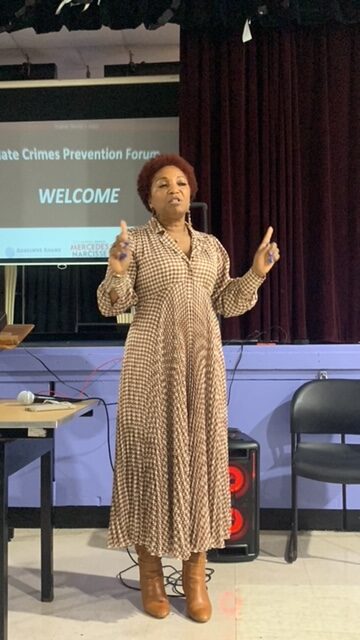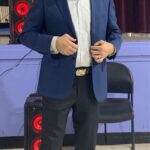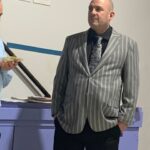In the midst of escalating antisemitic sentiments and hate-fueled demonstrations on college campuses, the Simon Wiesenthal Center’s presentation on April 15th, hosted by the Hebrew Educational Society (H.E.S.), at 9502 Seaview Avenue, provided a beacon of hope and resilience against the dark specter of intolerance.
The Community Forum served as a vital platform for examining the pervasive impact of hate on our communities and fostering proactive measures for hate crimes prevention. With a focus on the digital landscape’s role in propagating terrorism and intolerance, the forum featured insights from the Center’s experts on combating online hate, particularly among young people.
Michael Cohen, Director of the Wiesenthal Center’s Eastern Region, underscored the urgent need to address the rampant dissemination of hate speech on social media platforms. “With the rise of social media, hate and intolerance find easy breeding grounds, providing disgruntled individuals with a platform for their venomous ideologies,” he emphasized.
A highlight of the event was a poignant presentation by Jeff Schoep, a former leader of a neo-Nazi group, whose remarkable journey from hate to redemption captivated attendees. Schoep shared his transformative experience, describing his departure from the extremist movement as a profound awakening. “I could no longer be part of something I no longer believed in,” he recounted. His narrative, once steeped in bigotry, now serves as a powerful testament to the possibility of change and renewal.
Transitioning from a life entrenched in hate to becoming a fervent advocate for deradicalization, Schoep emphasized the importance of reconnecting with humanity. “For every extremist I help exit, there are potentially thousands who won’t become their victims,” he affirmed, highlighting the ripple effect of his efforts in dismantling hate networks.
Schoep’s exit from the hate group, after 25 years, came through a most remarkable meeting with an African-American jazz musician, who played with the likes of Little Richard, Chuck Berry and Elvis Presley. Daryl Davis, now a prominent advocate for racial reconciliation, helped over 200 Klansman leave these radical associations. Working together now, both Schoep and Davis exemplify the transformative power of dialogue in dismantling extremist ideologies. Through respectful engagement and empathy, they have facilitated the departure of numerous individuals from hate groups, underscoring the profound impact of human connection in fostering understanding and tolerance.
Councilwoman Mercedes Narcisse, who helped sponsor the forum, echoed the sentiment of unity and resilience, emphasizing the imperative of confronting hate in all its forms. “We cannot afford to harbor spaces for hate. Hate is not acceptable anywhere,” she declared, emphasizing the need for candid conversations in fostering more love than hate in our diverse society.
The Simon Wiesenthal Center’s Museum of Tolerance project, aimed at empowering youth to recognize and reject online hate, stands as a testament to the organization’s commitment to fostering a more tolerant society. Through dynamic workshops and educational initiatives, the Center has reached over 30,000 students, equipping them with the tools to combat bigotry and prejudice.
Schoep has since founded Beyond Barriers, a nonprofit organization, dedicated to countering and preventing extremism, that collaborates with the Simon Wiesenthal Center on these initiatives to change hate through humanization.
As hate continues to proliferate in the digital sphere and beyond, voices of reconciliation and understanding, such as Jeff Schoep’s, serve as powerful antidotes to the rising tide of intolerance. In the face of mounting challenges, the mission of the Simon Wiesenthal Center remains steadfast: to combat hate through education, empowerment, dialogue and human connection.
To explore more about the Simon Wiesenthal Center’s Museum of Tolerance project, and learn more about their programs, exhibits, events and education, visit museumoftolerance.com/



